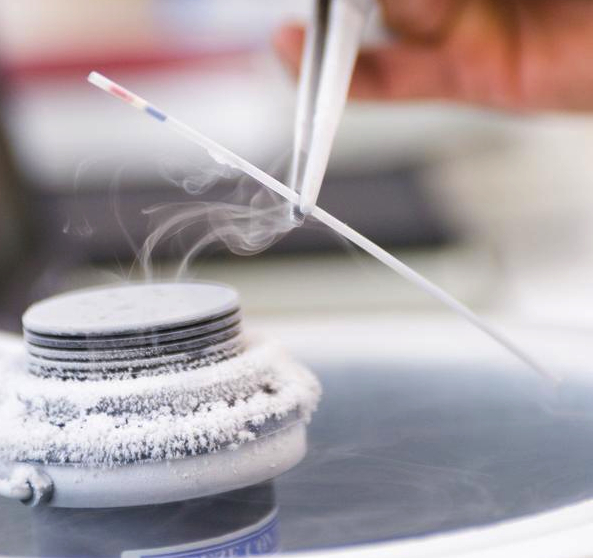Egg freezing is slowly becoming mainstream. From a medical standpoint, it’s no longer considered experimental. Tech companies are starting to offer it as a perk. And cryopreservation banks even throw “egg-freezing parties” to convince women that it’s a smart way to extend their childbearing windows.
Tag: cryopreservation
Everything We Still Don’t Know About Freezing Human Eggs
In an Era of egg freezing cocktail parties, it’s easy to forget that cryopreservation is, well, a little lacking in the science department.
Freezing Eggs To Make Babies Later Moves Toward Mainstream
Doctors who specialize in treating infertility are making a big change in their position on a controversial practice. The American Society for Reproductive Medicine (ASRM) has concluded that freezing women’s eggs to treat infertility should no longer be considered “experimental.”
The group plans to officially announce the change on Monday.
More and more women are using frozen eggs to try to have babies. Some older women use frozen eggs donated by younger women. Some younger women freeze their own eggs while they finish school, focus on their jobs or keep looking for the right guy.
That’s why Jennifer Anderson did it last year.
“I really wanted to have the traditional experience of falling in love and getting married, and then having children. But I know every person’s life path is different, and it hadn’t worked out for me yet to fall in love and get married,” says Anderson, 40, a consultant who lives in Arlington, Va.
So Anderson went to the Shady Grove Fertility clinic in Rockville, Md., to freeze some of her eggs. Read full article.
What is Egg Freezing
What Is Egg Freezing?
Egg freezing is a breakthrough technology that allows women to freeze and store their eggs until a pregnancy is desired. At that time, the eggs are thawed, fertilized and transferred to the uterus as embryos.
Who May Benefit
Many women today are postponing childbearing because they are focused on a career, are returning to school, or because they simply haven’t met the right person. For these women, egg freezing is revolutionary, not just in its technology, but in the life choices it allows them to make.
Over 50,000 reproductive-aged women are diagnosed with cancer each year in the United States. Surgery, chemotherapy and radiation treatments typically lead to infertility by destroying the eggs. While options vary depending on age, type of cancer and cancer-treatment plan, egg freezing can provide these women the opportunity to preserve their fertility.
And finally, egg freezing can be useful for individuals with religious or moral objections to storing frozen embryos that remain following a routine IVF cycle.
How Egg Freezing Works
It takes approximately four to six weeks to complete the egg freezing cycle, which follows the same protocol as IVF. This includes birth control pills and self-administered hormone injections to stimulate the ovaries. Eggs are retrieved and are frozen immediately following retrieval. When embryo transfer is desired, the eggs are thawed, injected with a single sperm to achieve fertilization, and transferred to the uterus as embryos.
Storage
We recommend that at least ten eggs be stored for each pregnancy attempt. For women under thirty-eight years of age, we normally harvest ten to twenty eggs per cycle. Based on our success with embryo freezing, we believe that long-term storage of frozen eggs is possible.
Success Rates
Our most recent frozen egg pregnancy rates are among the highest in the country – approximately 50% with the vitrification method. This figure is well above the national average for frozen embryos. Furthermore, we anticipate continued success and improvement in these rates with our dedication to ongoing research in the field.
Safety
To date, approximately 1500 babies have been born worldwide from frozen eggs. Among these births, the rate of birth defects and chromosomal defects has been no higher than that which we see in the general population.
Cost
The cost of egg freezing is approximately $10,000 – $15,000 plus annual storage fees.
Young Cancer Survivors Rarely Take Steps to Prevent Infertility
There are nearly half a million cancer survivors of reproductive age in the U.S., and new research finds that very few of them are taking steps to make sure they will retain the option of having children before starting treatment.
Freezing Eggs, Embryos Poses Legal Concerns
Canada’s fertility clinics are offering growing numbers of women the chance to freeze their biological clocks by put-ting eggs – and, in some cases, embryos – into cold storage until they’re ready to have a baby
